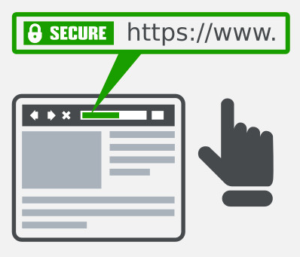
When it comes to improving your SEO, there should always be room in your strategy for experimentation. One of the common struggles that occurs when maintaining a website is choosing which tactics make the most sense for your business.
Running a successful website is a lot of work because you only have so much bandwidth available to keep the machine fine-tuned, depending on the desired purpose of the website – but don’t worry!
The following three tips were specifically chosen to help you boost your rankings quickly, and the best part: although simple in concept, they can lead to higher Google rankings and are therefore great to include as building blocks within a marketing strategy.
#1: Secure Your Website With an SSL
This year, Google is rewarding secure websites with ranking support by marking all HTTP pages that collect passwords or credit cards as “Non-Secure.” Google Chrome will mark HTTPS pages as “Secure” with a padlock icon next to the domain URL as a part of a long-term plan to phase out all HTTP pages.
 To obtain an HTTPS connection, you must begin with your own IP address by purchasing or upgrading to a non-shared one. From there, you’ll need to purchase an SSL certificate for your site. This certificate will give you a unique code that is verified every time someone visits your site, so they know that it is you (and not a scam site). Once you activate and install the SSL certificate, update your links to HTTPS and just like that, you’re one step ahead of the pack. Here’s an example of what your URLs should look like at New Wealth Advisors Club.
To obtain an HTTPS connection, you must begin with your own IP address by purchasing or upgrading to a non-shared one. From there, you’ll need to purchase an SSL certificate for your site. This certificate will give you a unique code that is verified every time someone visits your site, so they know that it is you (and not a scam site). Once you activate and install the SSL certificate, update your links to HTTPS and just like that, you’re one step ahead of the pack. Here’s an example of what your URLs should look like at New Wealth Advisors Club.
#2: Appeal to Your Audience with Focused Content
Finding the right way to connect to your audience through specific web placements has always been a huge part of online marketing. What marketers have learned over time is that there are multiple ways to deliver content that works. One element is similar, though, throughout all successful content strategies, and that is consistency in messaging.
Focusing on one, or a few consistent messages, should also be coupled with two important caveats. The first is to use keywords that are meaningful to consumers by not settling on generalized ones. The goal is to expand our user base, but that is not accomplished with the usage of vague words that have lost their weight and now fall onto deaf ears. The trick is to dig deeper into the specific function of what you are trying to promote – and this requires focus.
The second is to remember that you can communicate your message across different web pages. It’s not a good idea to try and jam too much information in your consumers’ faces, so analyze your customers’ journey and adjust to accommodate them from one page to the next.
#3: Be Ready for Authority Links, but Don’t Chase Them
Authority links are links from websites that have been established as leaders in their industry, and usually represent the best of the best in their specific market. These websites have a certain amount of influence in search result ranking and can boost your own if you are lucky enough to be linked on one of their sites.
The best way to benefit is to not hunt down the website managers of authority sites or constantly tend to them for a piece of the action; rather, you should make sure every page on your site is shareable. No matter how minimal the page is in your overall strategy, it should be able to stand alone if an opportunity for an authority link arises.
Apply these three SEO tactics to your strategy and you just might see positive results in no time. There are many ways to become more visible on the web and these are some of the best starting points – try them out!





About The Author: Kevin Watts
Kevin Watts is the founder of Raincross, a premier web design, development and digital marketing agency headquartered in Riverside, CA.
Kevin got his start in online marketing and website design by working for some of the most prominent names in online retail. He's most recognized for helping to start e-commerce retailer Organize.com in 1998, and spent 12 years running the company's e-commerce and online marketing operations. He has been recognized and has received several online retail, marketing and merchandising awards throughout his career.
Kevin grew up in Riverside, CA and graduated from the University of Wyoming. In his spare time, Kevin is an avid fly-fisherman, college football fan, and enjoys spending time with his son Matthew, daughter Kate and wife Lindsey.
More posts by Kevin Watts